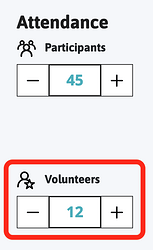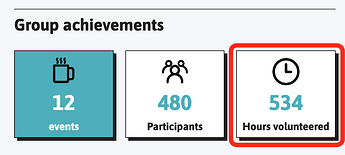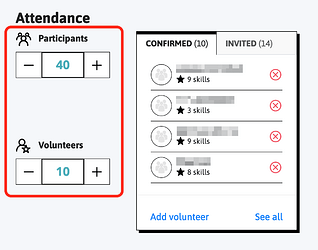One of the main purposes of this site is to help you record the impact of your repair events. Most obvious are the environmental impact stats, but as many of you will know, it’s also possible to record the number of volunteers who help out at events. And from that, the site produces a figure for the number of hours volunteered ![]()
→
^ Recording the number of volunteers on your event pages (left) means your group page shows how many hours your team has volunteered across all your events (right)
This can be a really interesting way to communicate just how committed your volunteer team is.
So, what’s the problem?
At the moment, this calculation may not work the way you would expect it to.
Currently, we assume that all events are three hours long. So we calculate the number of hours volunteered at an event like this:
number of volunteers X
3 hours =
number of hours volunteered
(we also add an additional 9 hours for event planning and clean up)
This made sense in the early days of the site, when we only ran our own events in London (which were all 3 hours), but it makes much less sense now that so many more people use it around the world and often run events that are longer or shorter than 3 hours.
For those of you who run longer or shorter events, the ‘hours volunteered’ calculation won’t be particularly accurate.
What’s changing?
The obvious way to fix this is to calculate the number of hours volunteered using the actual length of the event. So this is what we’re going to do.
Here’s the new calculation we’re introducing:
number of volunteers X
event length =
number of hours volunteered
(we’ll continue to add an additional 9 hours for event planning and clean up)
This will produce much more accurate figures for groups who run events that aren’t 3 hours long.
What does this mean for your group?
We’ve run some projections to see how this will affect every group. In total, 73 groups will be affected. Most of these groups will see a small reduction or increase (of less than 10%) in their total hours volunteered.
However, 29 groups will see a larger reduction or increase (of 10% or more). If this includes you, I’ll message each of you individually to let you know what to expect.
If you haven’t received a message from me by Friday (24 March), then you can expect to see a small (or no) change in your group’s ‘hours volunteered’ stats soon. But feel free to reply to this topic and I can let you know exactly what will change for your group.
I hope that all makes sense and that it’s clear why we’re making this change. But if you have any questions, feel free to post them below ![]()


